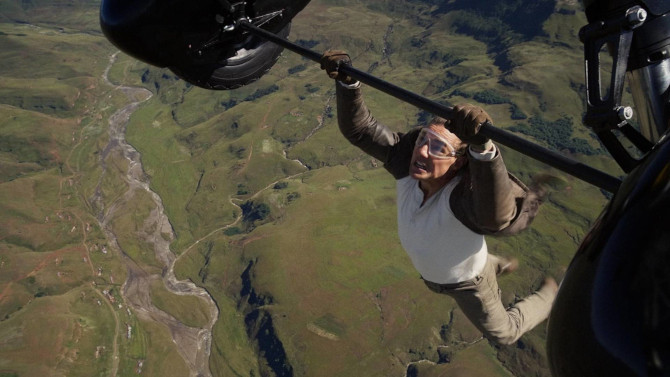
An Impossible Mission
How do you wrap up a franchise like Mission: Impossible? That is, if this even is the final installment... as they’ve made it sound (while at the same time, stars not named ‘Tom Cruise’ pipe up and suggest that might not be so). It has been twenty-nine years, with different writers and visionary directors – from twisty Brian De Palma and the action hair stylings of John Woo, to the lens flares of J.J. Abrams and animation expert Brad Bird, it was only about ten years ago that the franchise decided to opt for The Usual Suspects scribe Christopher McQuarrie for the final four. To return to that opening question once more, you could end with a Sopranos’ style cliffhanger, simply make another entertaining movie like the many before – like Everybody Loves Raymond did it with its final episode, or try to tie everything up in a neat little bow by bringing everything together as the Daniel Craig era did with James Bond. Well, it is definitely more along the lines of the latter example, with some distinct differences.
-

A Barrel of Bloody Laughs
Lock, Stock and Two Smoking BarrelsSeptember 18, 2016Numerous robberies, black market sales, an underground high stakes poker game, and traffic violations abound in Guy Richie’s first motion picture – Lock, Stock and Two Smoking Barrels. Featuring the now iconic director’s signature style, Richie fills his intricately plotted, multifaceted storyline with fast paced editing, even faster paced dialogue, his oddball sense of humour, rich personas, and eye-catching style that consists of both sepia tones as well as vivid colours. Though the tale consists of many varied characters, Eddy (Nick Moran), Tom (Jason Flemyng), Soap (Dexter Fletcher) and Bacon (Jason Statham) make up the main gang. They are a group of friends that have been together since childhood and have been small time crooks for nearly as long.
-

Blind Man’s Bluff
Don't BreatheSeptember 16, 2016Set within the decaying, abandoned neighbourhoods of Detroit, Fede Alvarez’s Don’t Breathe goes deeper by examining the decline of both family values and traditional American ideals. Following a gang of young hoodlums, at first glance they seem to be nothing but lowlife thugs. Yet, Alvarez provides enough of a back story for us to know that the female of the group, Rocky (Jane Levy – Frank and Cindy), is trapped in a single parent home with a mother (and her boyfriend) that is less than motherly. Stuck between a rock and a hard place, she is more of a mom to her little sister Diddy (the wide eyed Emma Bercovici) than the drug-addled, slovenly matriarch of the ‘family’.
-
Star Pick with Sean Astin
 I Love L.A. . . . ConfidentialL.A. ConfidentialSeptember 13, 2016
I Love L.A. . . . ConfidentialL.A. ConfidentialSeptember 13, 2016A few months back, I was fortunate enough to speak with Sean Astin. For those of you who have been living under a rock for the past three decades, Astin has starred in a plethora of memorable classics. With his mother being the late Patty Duke (Oscar winner – The Miracle Worker), he had large shoes to fill. Starting off with a bang, Astin, in his early teenage years, took on the role of Mikey in Richard Donner’s 1985 fantasy flick The Goonies. Following this, he has continued making wonderful motion pictures, including 1993's Rudy, 1998's Bulworth, as well as playing the beloved role of Samwise Gamgee in Peter Jackson’s The Lord of the Rings trilogy. He also showed off his comedic talents in 2004's 50 First Dates and 2006's Click. He has also conquered the television world, portraying Lynn McGill in ‘Day 5’ of 24 (a very strong season), as well as Jim Kent in Guillermo del Toro’s The Strain.
-

Here Alone Entertains at St. Lawrence Film Festival
September 11, 2016Last weekend, on Saturday the 3rd of September to be exact, the St. Lawrence International Film Festival held an upscale special screening/gala in the beautiful Performing Arts Centre at SUNY Potsdam in historic Potsdam, NY. Bringing an audience together from both the United States and Canada, the event was hosted by Ogdensburg native Mark Valley. The star television actor charted the course for the evening, mixing equal parts class and humour as he lightened the mood prior to the screening of the Tribeca Audience Award Winning horror suspense thriller Here Alone.
-

Mum’s the Word
Keeping MumSeptember 9, 2016In September we will mark the seventh anniversary of the death of Patrick Swayze. Becoming a powerhouse star of the 1980's and 1990's with classics such as Dirty Dancing, Ghost, Road House, Point Break, among others, the man left an indelible impact on the film industry. So, as a tribute here today, I am going to write about one of his last movie roles that can be found in the small, rarely seen 2005 British comedy Keeping Mum. Directed by Niall Johnson, the story follows a married reverend, Walter Goodfellow, played masterfully by Rowan Atkinson (Mr. Bean), his wife Gloria, Kristin Scott Thomas (The English Patient), and their two children, as their lives become more and more impacted by their new housekeeper Grace, the endearing Dame Maggie Smith (Professor McGonagall from the Harry Potter franchise).
-
Star Pick with Felix Silla
 Great Things Come in Small PackagesHigh NoonSeptember 6, 2016
Great Things Come in Small PackagesHigh NoonSeptember 6, 2016While at Trekonderoga on August 13th, 2016, the Ticonderoga, NY, comic con that is all things Star Trek (including the brilliant recreation of the original Starship Enterprise) , I was lucky enough to be able to interview several interesting actors – one of whom was Felix Silla, a man who has left an indelible yet oft hidden mark on the television and film industry over his five plus decades of work. Before I begin, I would like to thank the Trekonderoga staff for setting me up in such a wonderful (noise free) room for my interviews, with a beautiful background of the hilly, forested Adirondacks that frame the excellent three day event. The man behind the mask (or hair), was born in Italy in 1937, eventually making his way to the United States on November 24th, 1955, where the trained circus performer toured with the iconic Ringling Bros. circus (for seven years) and the Barnum & Bailey Show. Using his 3' 11" versatile frame to his advantage, he eventually made his way into show business in the early 1960s, taking on a plethora of intriguing roles. His big break came when he was cast as Cousin Itt on the original Addams Family television series in 1965.


